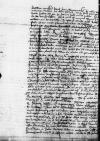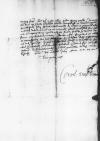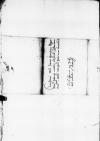Letter #357
Cornelis DE SCHEPPER to Ioannes DANTISCUSGenoa, 1527-07-17
English register:
De Schepper complains that he has not received any letters from Dantiscus, and he refers to his own from Genoa and Northern Spain. They [Chancellor Mercurino Gattinara's company] are stuck in Genoa, surrounded by French and Venetian forces. The imperial army in Italy is completely out of control. Antonio de Leyva holds Milan, while Swiss mercenaries, paid by the French, are advancing on the city. Hence there is no possibility of continuing the journey to the Chancellor's domains [in Piedmont].
It is not known where the Pope [Clement VII] is detained. A confrontation between the Venetian army and the imperial troops under Antonio de Leyva and the Count of Lodron is imminent. De Schepper mistrusts the self-confidence of De Leyva and his soldiers. He scorns the cruel looting of Milan by the Spanish and German troops. The Chancellor's company is still waiting for instructions from the Emperor [Charles V].
The King of Bohemia [Ferdinand Habsburg] aspires to the Hungarian throne. Lots of rumours circulate concerning the situation in Hungary. The appearance of John [Zápolya] with his sizable army as second pretender to the Hungarian throne is mockingly compared to the mythological stories about people rising from the earth after the sowing of dragon's teeth or stones. De Schepper does not think much of John [Zápolya]'s intellectual capacities. He refers to John [Zápolya]'s letter to the Hungarian nobility of which a copy was sent to Valdés.
He points Dantiscus towards Paolo Giovio's new publication on Muscovy, which he considers much more reliable than the one published by Johannes Faber. He asks Dantiscus to send him the Faber's work, because he wants to show it to the regent of Monaco, Archbishop Agostino Grimaldi.
The Chancellor has changed his way of life and is saving everything for his heirs. He is increasingly surrounded by friends from his home country and is becoming isolated from his collaborators. He is hesitating, although without reason. De Schepper is in doubt concerning his own position, and will, if necessary, seek his fortune elsewhere. Even though he does not want to let the Chancellor down, he asks Dantiscus and the Vice-Chancellor [Balthasar Merklin von Waldkirch] to explore the opportunities for a career change. If he does not succeed, he will have to turn to a last resort.
There is no news about the Bari question. De Schepper has drawn Gattinara's birth horoscope, but he could not finish it because of the travel conditions. Tomorrow it will be done, and then he will use the method recommended by Dantiscus.
He asks for news about the King of Denmark [Christian II] and Melchior Colditz. He is worried by rumours of riots in the Netherlands. Both the Duke of Ferrara and the Prince of Orange aspire to the succession of Charles de Bourbon in Italy, and both have sent envoys to the Emperor. He reports on the misfortunes encountered by the envoys of the prince of Orange? (princeps Oraycae) [Philibert de Châlon] on their journey; one of them will deliver De Schepper's letter to Dantiscus. He inquires about their mutual friends, the Count of Montfort-Rothenfels and the Counts Palatine, and asks to be recommended to their friends and to Dantiscus’ paramour [Isabel Delgada].
| received Valladolid, [1527]-08-06 Manuscript sources:
Auxiliary sources:
Prints:
| ||||||||||||
Text & apparatus & commentary Plain text Text & commentary Text & apparatus
Clarissimo domino
Salutem.
Miror, quod per novisimum cursorem nihil ad me scripseris, cum ego ex
Rex Bohemiae omnem penitus
Hic incidi in
libellum cuiusdam
De castro Barensi nihil audio, namque ab
Si quid de illustrissimo
Vale.
Tuus, quem nosti,
[1 ] Celtiberis: Celtiberia is the ancient denomination of the region in North-Central Spain inhabited by the Celtiberi tribes. It is situated in the hill country between the Tajo and Ebro rivers, a territory corresponding roughly with the Spanish provinces of Soria, Guadalajara and Teruel. Here the name is used in a broader sense, including the coastal region of North-Eastern Spain. In his letter cf.
[2 ] Insubria in antiquity the name of the area in Northern Italy inhabited by the Celtic tribe of the Insubres; the term is used here to indicate the Duchy of Milan
[4 ] The sudden appearance of a large Hungarian army is compared to the mythological image of an army or a people rising from the earth after the sowing of dragon’s teeth (Jason, Cadmus) or stones (Deucalion)
[5 ] Giovio’s account of the embassy of Grand Duke Vasilli III to Pope Clement VII in 1525 largely consists of a geographical description of Muscovy and the Northern regions, based on the information given by ambassador Dmitry Gerasimov cf. Paolo Giovio, Libellus de legatione Basilii magni Principis Moschouiae ad Clementem VII. Pontificem Maximum, in qua situs Regionis antiquis incognitus, Religio gentis, mores, et causae legationis fidelissime referuntur. Coeterum ostenditur error Strabonis, Ptolemaei, aliorumque Geographiae scriptorum, ubi de Rypheis montibus meminere, quos hac aetate nusquam esse, plane compertum est, Roma, Franciscus Minitius Calvus, 1525 , f. Aiiv⌊GIOVIO 1525cf. Paolo Giovio, Libellus de legatione Basilii magni Principis Moschouiae ad Clementem VII. Pontificem Maximum, in qua situs Regionis antiquis incognitus, Religio gentis, mores, et causae legationis fidelissime referuntur. Coeterum ostenditur error Strabonis, Ptolemaei, aliorumque Geographiae scriptorum, ubi de Rypheis montibus meminere, quos hac aetate nusquam esse, plane compertum est, Roma, Franciscus Minitius Calvus, 1525 , f. Aiiv⌋. The book entitled libellus de legatione Basilii magni Principis Moschouiae ad Clementem VII. Pontificem Maximum, in qua situs Regionis antiquis incognitus, Religio gentis, mores, et causae legationis fidelissime referuntur. Coeterum ostenditur error Strabonis, Ptolemaei, aliorumque Geographiae scriptorum, ubi de Rypheis montibus meminere, quos hac aetate nusquam esse, plane compertum est was published in 1525 in Rome
[12 ] P.M. note to be elaborated on this mission, and also on the recognition of Alfonso I d' Este's rights to his duchies by Charles V, against the Pope



